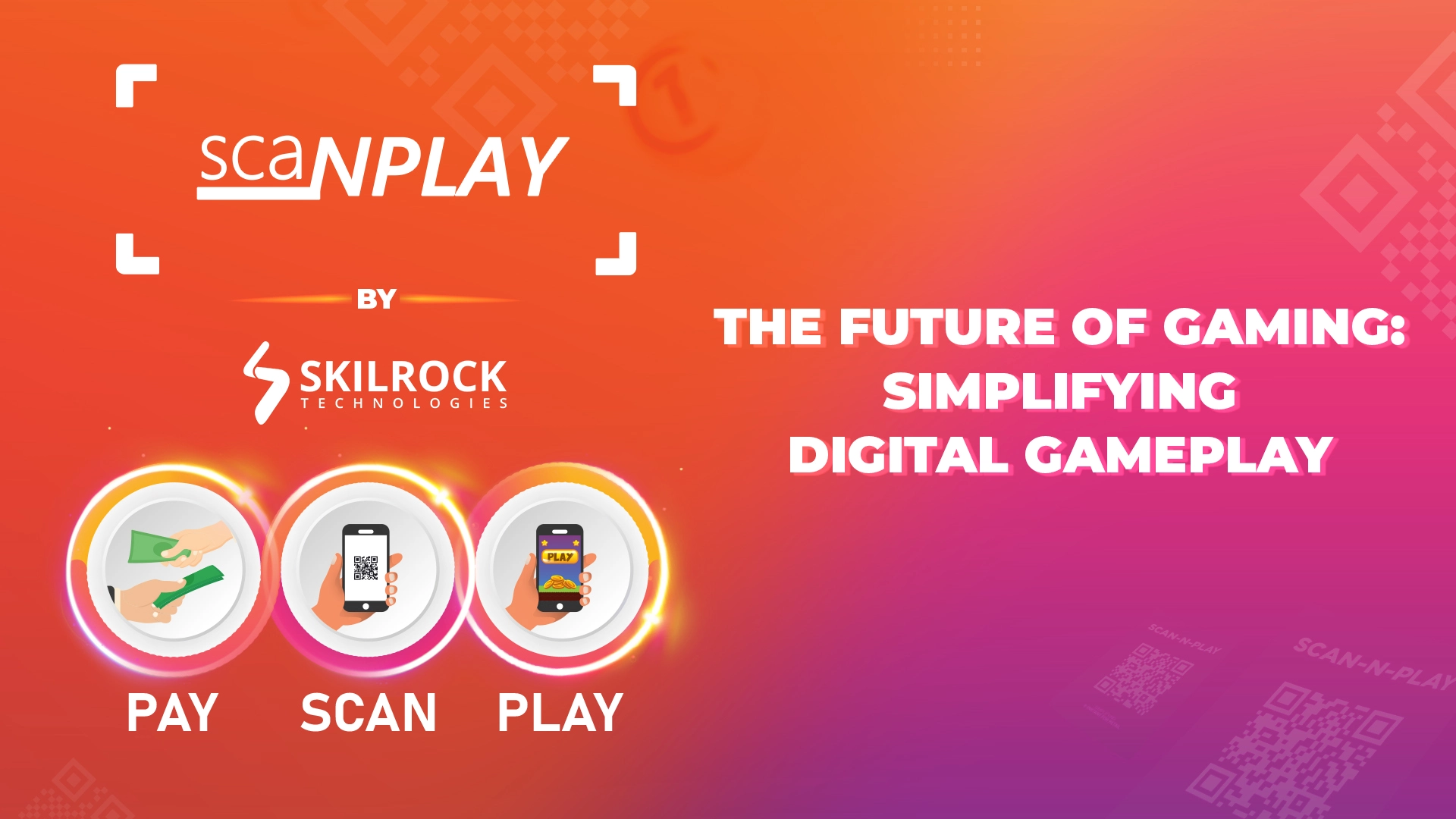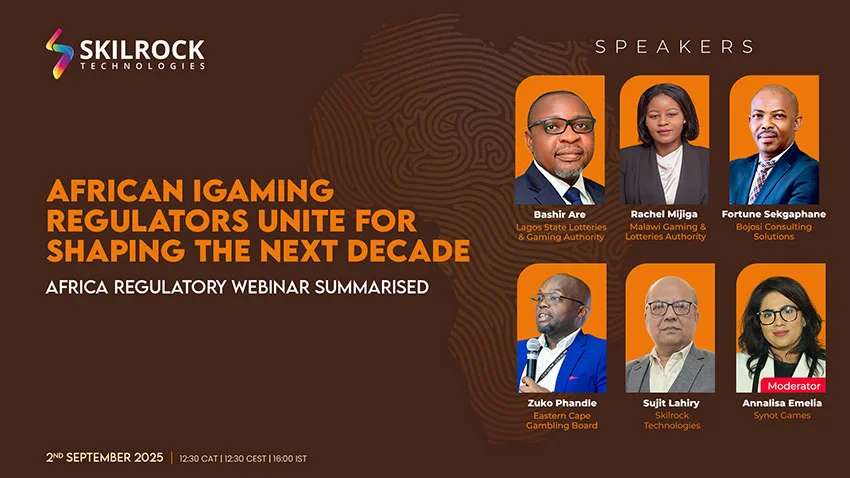Evolve, Unify, Thrive: LatAm Gaming Evolution
Insights from Our Expert-Led Webinar
The Latin American (LatAm) gaming market is undergoing a remarkable transformation, driven by regulatory changes, technological advancements, and a burgeoning interest in digital entertainment. Analysts project Latin America to become a $12 billion market by 2028. Our recent webinar, "Evolve, Unify, Thrive: LatAm Gaming Evolution," brought together industry experts to discuss the dynamic shifts and opportunities within this vibrant sector. This blog delves into the themes discussed during the webinar, highlighting the insights shared by our esteemed speakers –
- Rodrigo Cigliutti, Executive Director, CIBELAE (Moderator)
- Esmeralda Britton González, President, Junta de Protección Social (JPS)
- Alexandre Tauszig, Commercial Director, NGX
- Carlos Sanz, President, James Industries Mexico, S.A. de C.V.
- Teresita Benitez, Coordinator - Technology Commission, CIBELAE
- Carlos Alberto Contreras Pardo, Project Coordinator - LatAm, Skilrock Technologies
Key Highlights from the Webinar: Insights from the Experts
Modernization of Traditional Lottery Channels: Navigating Challenges and Uncovering Opportunities Amidst State Regulations
Esmeralda Britton González
The Social Protection Board has undergone significant modernization. They moved the sale of pre-printed lotteries (National and Popular Lotteries) to an online platform, which boosted their growth for four years. After ending a contract with IGT, they took over point-of-sale administration and launched an electronic lottery on their website, reaching new markets.
This transition required organizational changes and adaptation. Implementing responsible gaming measures, like requiring ID at the point of sale, aims to enable instant prize payments and future direct account transfers, enhancing responsible gaming and combatting illegal sales in Costa Rica.
Teresita Benitez
The Social Protection Board's technological advancements, including cloud computing and storage, have reduced the need for large data centers, demonstrating the benefits of innovation and secure, scalable services. Successful development requires skilled personnel.
However, regulation by the State is essential. Lotteries are adapting laws, originally designed for physical games, to digital formats, addressing threats like cyberattacks and ensuring information security. Integration of physical and digital platforms is crucial for a seamless user experience.
Omnichannel integration and clear state regulations are necessary for coherence in user experience. Unified databases, responsive applications, and secure data management are vital. There are regulations and certifications guiding these processes.
Key challenges include integrating platforms, managing unified player accounts, and centralizing customer information with a focus on data protection. Opportunities include optimizing physical channels, improving game quality, and leveraging technologies like artificial intelligence and machine learning for inventory and player profiling.
Carlos Contreras
Modernization and digital transformation in lotteries are crucial. State regulations are essential for protecting players and ensuring responsible gaming while adapting to digital innovations. The expansion of mobile services presents great opportunities for player engagement and mobility.
Transitioning to digital platforms involves challenges like cybersecurity, integration, and legislative support. Quick prize payments and secure transactions are vital, particularly with the use of SEO numbers or IBAN accounts in Costa Rica.
Hybrid lotteries, which blend traditional and digital platforms, require robust logistics but offer a modern experience. Transitioning to virtual lotteries demands significant development efforts, backed by service providers to ensure security and user-friendly experiences. Technological advancements and mobile communication make lotteries more accessible and engaging for players.
Carlos Sanz
In Mexico, several fundamental issues exist in the regulatory aspect of the lottery system. The National Lottery has had a monopoly for centuries, with specific regulations governing games and raffles. Some permit holders are allowed to conduct lottery activities, but the regulatory framework is weak, lacking comprehensive legislation despite ongoing promises for a decade.
Private permit holders face competition from the National Lottery and related pools, which possess extensive expertise. Another challenge is the traditional anonymity of the lottery. Paper tickets do not require identification for purchase or prize collection unless they exceed a threshold for tax or anti-money laundering purposes.
The lack of banking services for much of the population further complicates modernization. While online gaming requires identification, traditional lotteries remain anonymous. Technological implementation at physical points of sale faced security issues, so they utilized existing retail networks for transactions, relying on phone numbers for customer identification.
Despite the potential growth afforded by technology and widespread smartphone use, the lottery's anonymous nature presents significant challenges.
Alexandre Tauszig
During the pandemic, Brazil, along with other countries, faced significant challenges that accelerated digital transformation. A unique development in Brazil was the introduction of PIX, a public payment architecture mandated by the Brazilian government, which facilitates instant payments using QR codes. This innovation revolutionized Brazil's banking system and greatly boosted online gaming.
Recently, Brazil has been intensively working on regulating online gambling. From January 1, 2025, online gambling, including fixed-odds bets and casino-like games, will be regulated. Offshore operators are no longer allowed since October 1, 2024, unless they obtain a federal license.
Brazil views all online games as lottery modalities, regulated under stringent requirements. The integration of PIX ensures that all payments are traceable, linking transactions directly to individuals' tax IDs. This system enhances responsible gaming and anti-money laundering efforts by providing complete data on player activities to the government. The stringent regulatory environment and the use of PIX make it easier to monitor and manage player behavior and financial transactions.
Navigating the Brazilian
Gaming Landscape: Essential Knowledge for Operators
Alexandre Tauszig
In Brazil, operators wishing to conduct gaming activities must submit a series of documents for evaluation by the government and pay a licensing fee of 30 million reais (about 5 million dollars) for a five-year license. The gaming platform must be certified. High regulatory standards might push operators to stay clandestine if the formal requirements are too stringent.
However, the PIX payment system, which allows instant transfers and is closely monitored by the government, is expected to reduce illegal gambling. Since all transactions through PIX are traceable to individuals' tax IDs, it provides a significant barrier against illegal online gaming. The ease of legal gaming and the traceability of transactions through PIX should discourage players from seeking illegal options.
The Rise of Digitization and Its Impact on Physical Points of Sale (POS)
Esmeralda Britton González
In Costa Rica, 90-95% of the Social Protection Board's points of sale are integrated with other businesses like mini markets and pharmacies. This integration encourages people to buy lottery products during their regular shopping. The transition to online sales via mobile applications has expanded the customer base, allowing purchases from anywhere.
Artificial intelligence helps understand and segment customer preferences, tailoring products to different market segments. This has attracted younger customers who prefer online purchases, especially for popular products like the Christmas lottery.
The board aims for an omnichannel presence, combining online and physical sales channels. Physical sales remain crucial, contributing around 70% of income, and the board continues to innovate in product offerings to support sellers and maintain revenue. Both online and physical sales are vital for reaching a broad customer base and adapting to market needs.
When the Social Protection Board took over the electronic lottery, they had to search for and re-establish points of sale, as many believed the previous contract with the operator would continue. Initially, they started with only 65 out of 1800 points. They had to explain the new business model to the points of sale, requiring them to make guarantee deposits and adapt to different services. This process involved significant effort from various departments. Ultimately, they nearly matched the previous number of points of sale, generating 80% of the income, and achieved greater profitability by saving on commissions.
Mastering the Omnichannel Environment: Challenges and Risks
Teresita Benitez
Recognizing the risks associated with modernization and digitalization is crucial, and senior management must address them seriously, making necessary investments. As hyperconnectivity and AI grow, both positive and negative uses increase, with cybersecurity and data protection being paramount concerns. Specific standards like those of the World Lottery Association must be adhered to, as the risks can be as severe or worse than illegal gambling.
Cybercriminals can exploit platform vulnerabilities, access personal data, manipulate transactions, and hijack information. Thus, fraud prevention should leverage technology, including real-time AI monitoring. Regulation must balance physical and digital channels to avoid ambiguity and ensure consistent standards for responsible gaming, consumer protection, and accessibility.
Inclusion is essential, catering to preferences for both paper and digital options. Additionally, cultural diversity and unique gaming habits must be preserved. State control platforms should monitor operations in real-time, with clear rules and regulations to manage technological innovations, including diverse payment methods like cryptocurrencies. This approach ensures safety and respects local gaming cultures.
Carlos Contreras
Understanding the player has become crucial in the transition to digital lotteries. Previously, lottery operators had limited knowledge about their customers who purchased physical tickets. Now, technology and developed solutions enable operators to gather detailed information about players, such as age, preferences, and gaming habits. This allows for personalized interactions, like sending targeted messages and offers.
Online gambling has significantly increased in Latin America, and knowing the player helps tailor experiences. For example, operators can identify which sports or games players prefer and customize promotions accordingly. Technologies like PIX and Scan-n-Play simplify payments, making it easy for players to access services and encouraging their engagement.
Ultimately, the goal is to make the acquisition of lottery products seamless, enhancing player experience and loyalty, which are essential for the success of the ecosystem.
Local Gaming Content: Distinctive Cultural and Societal Features
Carlos Sanz
There are two main types of clients: digital and traditional. Targeting only digital clients would exclude many potential customers. In Mexico, anonymous payments can be made via QR codes at stores like Oxxo and 7-Eleven, facilitating digital interaction.
Lottery technology can be applied beyond traditional uses, such as universities using raffles for fundraising. Private operators can offer technology to various businesses for raffle activities, enhancing customer interaction and loyalty.
Certified lottery technology can help businesses run raffles effectively. Clients readily identify themselves for these activities, simplifying interaction and engagement.
Alexandre Tauszig
The physical lottery game will continue to thrive alongside online gaming. There is a diverse audience for both, and a blend of physical and digital channels will become more prevalent and successful. For instance, solutions like Scan-n-Play, where players purchase online games through physical mediums, bridge the gap between the two. Operators are increasingly focusing on integrating street and online sales channels to enhance their reach and success.
From Webinar Insights to Action: Growth Factors in Latin America's Gaming Sector
These insights highlight the dynamic opportunities and strategies that are shaping the future of the LatAm gaming market. Here, are the pivotal elements that contribute to this growth trajectory.
Regulatory Evolution: Regulatory changes in Latin America have been pivotal in transforming the gaming landscape. Countries like Brazil and Colombia have taken significant steps to establish a more regulated and structured gaming market. For example, Brazil is in the process of legalizing sports betting, marked by the approval of Law No. 13,748/2018 and further supported by Ordinance No. 827/2024. This legalization is expected to open up a multi-billion-dollar market. Conversely, Colombia was the first in the region to regulate online gaming in 2016, setting a precedent for other nations. These regulatory advancements provide a safer and more transparent environment for operators and players, encouraging more international investments and partnerships.
Rising smartphone user adoption: Over 65% of the population in Latin America owns a smartphone, at a baseline increasing access to mobile gaming. Smartphone penetration is expected to increase to 83% by 2025.
Strong and growing youth population: Latin America boasts a youthful and tech-savvy population, which forms the backbone of the gaming market. According to the Organisation for Economic Co-operation and Development (OECD), approximately 20.6% of Brazil’s population and 24.5% of Mexico’s population are defined as youth, creating a dynamic consumer base eager for new gaming experiences. This demographic is more likely to embrace digital entertainment, including online and mobile gaming. Moreover, the youth are trendsetters and influencers, driving the popularity of esports and multiplayer games. Their engagement with gaming platforms not only boosts user numbers but also encourages game developers to create content that resonates with this vibrant audience. As this young population continues to grow, it ensures a steady demand for innovative gaming solutions.
Network effects of an influencer-led culture: The gaming industry in Latin America thrives on the network effects of an influencer-led culture. Influencers with massive followings on platforms like YouTube, Twitch, and Instagram drive significant traffic, engagement, and viral marketing. They understand local cultural nuances, fostering dedicated communities and engaging in cross-promotions. Social connections are crucial for gamers when choosing games, and joining existing gamer communities is a compelling reason for new players. Latin America's influencer density is similar to that of the United States (3%) compared to Europe's 1.6%, with one in three internet users following an influencer.
As the industry continues to evolve, staying attuned to these trends and opportunities will be crucial for operators and stakeholders. For those who wish to revisit the detailed discussions and expert opinions shared during the webinar, the link to rewatch is attached - WATCH HERE.


 English
English

 Spanish
Spanish
 Portuguese
Portuguese














